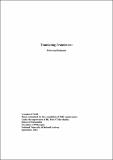| dc.description.abstract | There is more to language than communication and more to translation than transferral of what is communicated between languages. A translation theory that is rooted in a preconception as to the 'why' of translation sees language and translation as purely communicative, and this results in dichotomous debates as to the 'how' of translation: the literal vs. free debate for example. Moreover, with translation considered purely in terms of transferral of what is communicated in one language into another, the focus will naturally remain on the finished product of translation With such a content based focus, the process of translation and what it can reveal about the underlying nature of language and translation is overlooked. Benjamin's theory of translation allows for a stepping back to a different perspective. Not identifying with any particular content to the exclusion of its opposite, he is instead concerned with a way: a way of thinking, a way of seeing, and also what happens in this way. In this non-identification, Benjamin deflects our gaze to where he is looking, and in the context of translation his point of focus is the process rather than any end product in the form of a translated text. Benjamin's concepts of 'kinship of languages' and 'pure language of translation' offer terms within which to include and explore what is more to language and translation, a 'moreness' that is discernible fleetingly in process, the process of translaton; and Heidegger's illustration of the process of translation, in both 'Dialogue on Language' and 'Anaximander's Saying', offers the context within which to illustrate Benjamin's concepts on practice. | en_US |


